Togo boss praises team's 'desire' and 'rage'published at 14:37 BST 7 July 2022
Togo manager Kai Tomety hails the desire and "rage" of his players after as they claim a first point at the Women's Africa Cup of Nations.
Read MoreTogo manager Kai Tomety hails the desire and "rage" of his players after as they claim a first point at the Women's Africa Cup of Nations.
Read More Celestina Olulode
Celestina Olulode
BBC News, Westminster Magistrates Court
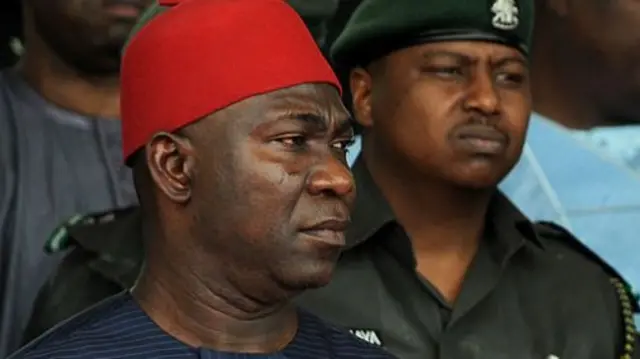 Image source, AFP
Image source, AFPIke Ekweremadu has been a senator in Nigeria since 2003
The British judge hearing the case relating to Nigerian senator Ike Ekweremadu and his wife, Beatrice, has accepted that the complainant is not a child as previously reported.
The two appeared in a court in London on Thursday.
Both are accused of conspiring to bring a person to the UK for organ donation.
Prosecutors allege the couple planned to have his kidney removed so it could be given to their daughter.
It is alleged the Ekweremadus treated him as a slave before he escaped and went to a police station.
Initially, the Metropolitan Police had said that person was a child.
The defendants walked into the dock at Westminster Magistrates Court and spoke only to confirm their names, dates of birth and address.
Mr Ekweremadu is charged with conspiracy to arrange or facilitate travel of another person with a view to exploitation, while his wife is charged with arranging or facilitating travel of another person with a view to exploitation.
The couple were not asked to enter pleas, but the court heard they have indicated not guilty pleas.
They deny there was a criminal conspiracy, and will say no exploitation occurred, it was said.
Mrs Ekweremadu, 56, was dressed in a black and white shirt with a dark jacket on top.
Mr Ekweremadu, 60, wore a grey tracksuit jumper, red T-shirt and glasses.
A prison guard was seated between the husband and wife.
The public gallery was packed with supporters, representatives from the Nigerian high commission and family members.
The police became aware of the case on 5 May when the complainant arrived at a police station.
The 20-minute hearing was presided over by Deputy Senior District Judge Tan Ikram, who sent the case to a higher court to be heard on 4 August. The senator and his wife will remain in custody.
Marco Oriunto
BBC Focus on Africa radio
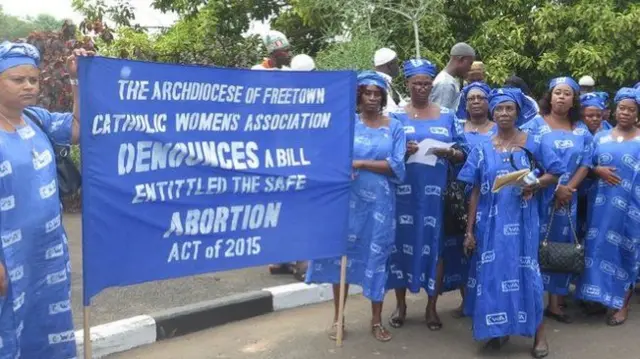
In 2016 religious groups protested about the plan to legalise abortion
Sierra Leone’s information minister has defended plans to decriminalise abortion - a contentious issue in the West Africa nation.
Rahman Swaray said it was not a gimmick - and the government intended to pass the legislation.
“This is not about pleasing the international community, it’s about addressing key and critical challenges facing our country,” he told BBC Focus on Africa’s Umaru Fofana in Freetown.
He said that 14% of those who die during child birth did so because of unsafe abortions - many of them teenagers.
Sierra Leone has the highest maternal mortality rate in the world, according to the UN, with 1,360 mothers dying for every 100,000 live births.
Abortions have been banned in Sierra since 1861. In 2016, MPs did pass a bill to decriminalise them, but then-President Bai Koroma blocked the legislation after protests by religious leaders.
Speaking at a conference on sexual health last week, current President Julius Maada Bio said his government would try again at a time when sexual reproductive rights for women were under attack - a reference to the US Supreme Court's recent overturning a woman’s constitutional right to an abortion.
Some believe President Maada Bio’s words were just for international ears. But Mr Swaray insisted the president did “not showboat” and the new legislation would be drafted and tabled in parliament.
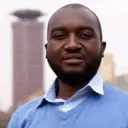 Emmanuel Igunza
Emmanuel Igunza
BBC News, Nairobi
The UN has warned that eight of the 18 regions in Somalia are now at serious risk of sliding into famine by September, due to a devastating drought and the war in Ukraine.
At least 200 children have died of malnutrition and disease since January.
The number of people suffering from food insecurity has increased to seven million people compared to 4.5 million in May.
"While nearly four million people [in Somalia] have received assistance since January, we need much more cash, greater resources to meet growing needs and avert famine,” Stéphane Dujarric, the spokesperson for the UN Secretary General said.
The warning comes as the UN’s Food and Agriculture Organization released new figures showing that nearly 10% of the world’s population are affected by hunger.
Eastern Africa and the Sahel are the most affected regions in Africa.
Read more on this story:
Somalia drought: ‘If we don’t act, 350,000 will perish’
Namibia will face Kenya for a spot at next year's Rugby World Cup after both sides secured their places in the Rugby Africa Cup final.
Read MoreIt is 30 years this week since South Africa returned from a ban from global football and played its first international against Cameroon.
Read MoreKalkidan Yibeltal
BBC News
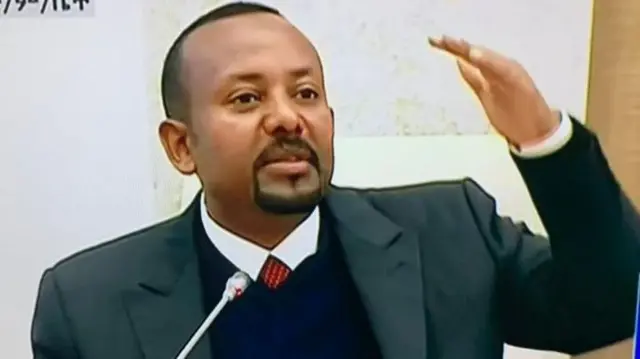
Ethiopia’s Prime Minister Abiy Ahmed says his government is "deeply sorry" that it could not protect civilians killed in recent attacks.
Farming villages in Oromia region, in the country’s west, were targeted in a wave of attacks that claimed more than 300 lives.
Mr Abiy however said the recurrence of violence was not a result of negligence by the authorities.
“The government is making efforts 24 hours a day to ensure the safety of the citizens,” he told the country’s lower house of parliament on Thursday.
The prime minister was met with questions from lawmakers on why security forces have repeatedly failed to prevent attacks.
“Terror is a global problem. It must not be seen that it’s something uniquely given to Ethiopia," he said.
Mr Abiy additionally condemned unnamed "foreign enemies" and "domestic traitors" for the country’s worsening security problems.
His remarks came as pressure grows on the government, with some accusing the authorities of complicity in the attacks that officials have blamed on a rebel group.
Demonstrations triggered by the attacks have led to clashes between protesters and security forces.
It’s unlikely that Mr Abiy's remarks alone would be enough to quell festering public resentment and anger.
Meanwhile an MP from his own party created a social media buzz earlier in the week when he accused government forces in Oromia for the violence in the region.
And with no representative from the embattled Tigray in the parliament, lack of basic services and massive humanitarian crisis in the northern region once again have failed to be discussed.
Four people who set up a Facebook event to find "the real Batman" are charged with "planning a riot".
Read MoreFox News host Emily Compagno has attracted a storm of rebuke on Twitter for comments that "Kenyan pregnant women can't leave the house so they absolutely have no constructive right to vote".
She was commenting on women's voting rights in the US and drew comparisons with Kenya and Oman.
Allow X content?
This article contains content provided by X. We ask for your permission before anything is loaded, as they may be using cookies and other technologies. You may want to read X’s cookie policy, external and privacy policy, external before accepting. To view this content choose ‘accept and continue’.
Kenyan law grants equal voting rights to all adults and pregnant women are given priority in voting queues.
Women politicians and Twitter users in the country have rebuked Ms Compagno's comments.
Kitui county governor, Charity Ngilu, urged Ms Compagno to "start by locating Kenya on the map first maybe".
Esther Passaris, the Woman Representative of the capital, Nairobi, urged the Fox News host to retract her statement.
"Pregnant women in Kenya are allowed to leave the house. Pregnant women in Kenya can vote. Pregnant women get priority on voting lines," she tweeted.
Acclaimed author Yvonne Owuor was critical of "American-style arguments".
"I hear researching ideas before publicly pontificating is a crime there," she said.
Derrick Kathurima was more reconciliatory.
"You’d be blessed to live in our beautiful Kenya. Now, please offer our sisters, moms, wives the apology they deserve."
Ghana forward Felix Afena-Gyan signs a new four-year contract with Italian Serie A side Roma.
Read MorePeople on the continent have been tweeting their reaction to the political machinations in the UK.
The latest chapter in the saga is that Prime Minister Boris Johnson has said he will step down as leader of the Conservative Party but will remain in office until October.
Economist journalist John McDermott has been collecting a few comments on Twitter.
Ali Naka has said on behalf of the continent that "we are closely monitoring the situation in Britain and making sure that it does not escalate and that the will of the people will be respected... we stand with the people of UK."
Allow X content?
This article contains content provided by X. We ask for your permission before anything is loaded, as they may be using cookies and other technologies. You may want to read X’s cookie policy, external and privacy policy, external before accepting. To view this content choose ‘accept and continue’.
Chris O Ògúnmọ́dẹdé continues the satirical theme saying "we stand ready to help the British people transition from this period of grave uncertainty".
Allow X content?
This article contains content provided by X. We ask for your permission before anything is loaded, as they may be using cookies and other technologies. You may want to read X’s cookie policy, external and privacy policy, external before accepting. To view this content choose ‘accept and continue’.
Another commenter, urging Mr Johnson to stay on, said that he was "showing the world that a sit-tight entitlement mentality is not unique to any people or region".
Allow X content?
This article contains content provided by X. We ask for your permission before anything is loaded, as they may be using cookies and other technologies. You may want to read X’s cookie policy, external and privacy policy, external before accepting. To view this content choose ‘accept and continue’.
Zimbabwean journalist Hopewell Chin’ono thinks that Mr Johnson's proposed plan to stay on until October sounds like a tactic of former President Robert Mugabe.
Allow X content?
This article contains content provided by X. We ask for your permission before anything is loaded, as they may be using cookies and other technologies. You may want to read X’s cookie policy, external and privacy policy, external before accepting. To view this content choose ‘accept and continue’.
And Glen Sungano Mpani says that Mr Johnson showed that trying to cling to office was not just an African issue:
Allow X content?
This article contains content provided by X. We ask for your permission before anything is loaded, as they may be using cookies and other technologies. You may want to read X’s cookie policy, external and privacy policy, external before accepting. To view this content choose ‘accept and continue’.
Didier Bikorimana
BBC Great Lakes Service
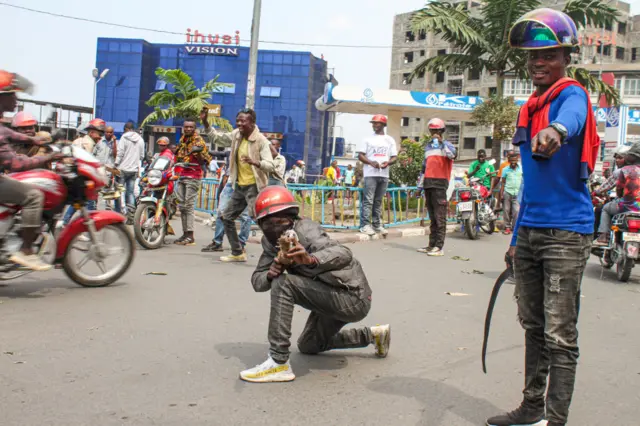 Image source, AFP
Image source, AFPRwanda-DR Congo relations have been tense since M23 resumed attacks in North Kivu
Congolese M23 rebels say talks between Rwandan President Paul Kagame and his Democratic Republic of Congo counterpart Félix Tshisekedi will not stop the fighting in eastern DR Congo.
The Wednesday talks in the Angolan capital Luanda – under the mediation of President João Lourenço – agreed to a de-escalation of tensions between the two neighbours.
The leaders also called for an “immediate cessation of hostilities and immediate withdrawal and without condition of M23 from its positions in DRC”.
But M23 spokesperson Major Willy Ngoma has told BBC Great Lakes that the group will not withdraw from its positions.
“Withdrawing to go where?” Major Ngoma asked. “We are Congolese. Do you want us to live without a country?”
He said this was a Congolese political problem to be solved among Congolese people.
The armed group says it fights for a “noble and just cause” of defending the rights of Kinyarwanda-speaking Congolese – those it says are marginalised - but the Congolese government accuses it of being a Rwandan proxy.
Rwanda-DR Congo relations have been tense since M23 resumed attacks in North Kivu province in late March after nearly a decade without a major offensive.
Each side blames the other for starting the fighting, which has displaced more than 170,000 people, according to the UN.
The rebels recently captured the town of Bunagana on the border with Uganda.
DR Congo accuses Rwanda of backing the M23, which both Kigali and the rebels have consistently denied.
 BBC Monitoring
BBC Monitoring
The world through its media
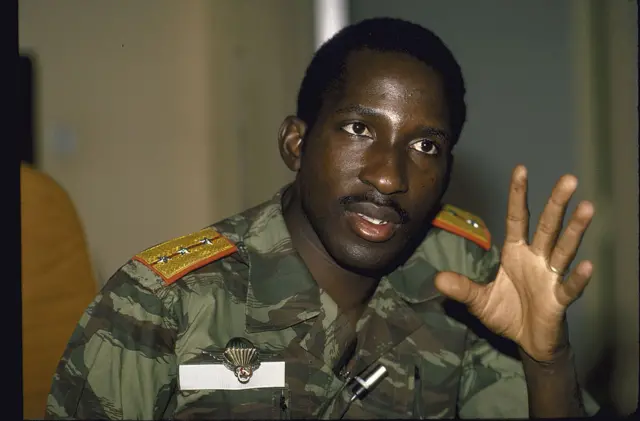 Image source, Getty
Image source, GettyThomas Sankara was killed in a 1987 coup that brought Blaise Compaoré to power.
The family lawyers of Burkina Faso's independence hero, Thomas Sankara, have called on the judiciary to arrest former President Blaise Compaoré, who is expected to return home from exile on Friday.
Mr Compaoré, in exile since his ouster in 2014, was in April handed down a life sentence over the 1987 assassination of Sankara.
The demand by Sankara’s lawyers came after the Burkina Faso government announced that Mr Compaoré will be among the former heads of state holding talks with military junta on Friday “as part of efforts to accelerate the question of reconciliation”.
It is unclear whether Mr Compaoré will be subjected to a judicial process.
However, the government said that the upcoming meetings between the junta and ex-leaders “does not hinder the legal proceedings initiated against some of them".
Read more:
 Image source, Getty Images
Image source, Getty ImagesA Kenyan court has frozen bank accounts run by a Nigerian online payments' company amid allegations they are linked to fraud and money-laundering.
The company has denied these allegations.
Kenya’s Assets Recovery Agency (ARA) said it sought and was granted orders freezing a total of 6.2bn shillings ($52.5m; £43.9m) in 62 bank accounts belonging to Flutterwave and six other firms.
Flutterwave is a Nigerian company that allows African businesses and their customers to make online payments.
Last year it became the fastest African-led company on the continent to have reached a billion-dollar valuation.
The Kenyan authorities say there was no explanation or supporting documents to back Flutterwave's transactions in 29 accounts that were spread across three banks.
The accounts contained amounts in Kenyan shillings, US dollars, euros and pound sterling.
Flutterwave is also accused of not having authorisation from Kenya's Central Bank to provide payment services.
“Further investigations established that there are reasonable grounds to believe that the funds are proceeds of crime obtained from illegitimate sources by the respondent which require to be preserved pending the filing and hearing of an intended forfeiture application,” the agency is quoted as having submitted in court.
But in a response, Flutterwave said: "Claims of financial improprieties involving the company in Kenya are entirely false and are being circulated as part of a disinformation campaign. Flutterwave has been a target of deliberate false media reports and misrepresentations."
Allow X content?
This article contains content provided by X. We ask for your permission before anything is loaded, as they may be using cookies and other technologies. You may want to read X’s cookie policy, external and privacy policy, external before accepting. To view this content choose ‘accept and continue’.
Update 10:19 GMT - this entry was amended to include Flutterwave's response.
Kalkidan Yibeltal
BBC News, Addis Ababa
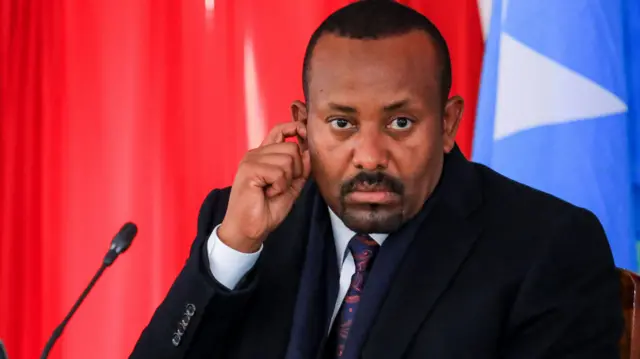 Image source, EPA
Image source, EPAPrime Minister Abiy Ahmed previously called the attacks a "massacre"
Ethiopia’s Prime Minister Abiy Ahmed is expected to address the country’s parliament on Thursday as pressure mounts on his government over the killing of hundreds of ethnic minorities in two separate attacks in recent weeks.
The violence last month in farming villages in Oromia region, in the country’s west, claimed more than 300 lives.
Many were killed in yetanother attack two weeks later.
This will be Mr Abiy’s second appearance before lawmakers in less than a month.
While authorities have been quick in blaming a rebel group for the attacks in Oromia, public anger has been directed towards the government with some accusing officials of complicity.
Protests were held in multiple places in recent weeks.
And with violence continuing to rage in several parts of the country, questions are being raised about the government’s capacity to deal with insecurity.
There has been a lull in fighting in a civil war in northern Ethiopia after a humanitarian truce was declared in March.
But conflicts in other parts of Ethiopia indicate the country is still struggling with violence.
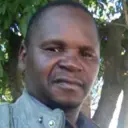 Jose Tembe
Jose Tembe
BBC News, Maputo
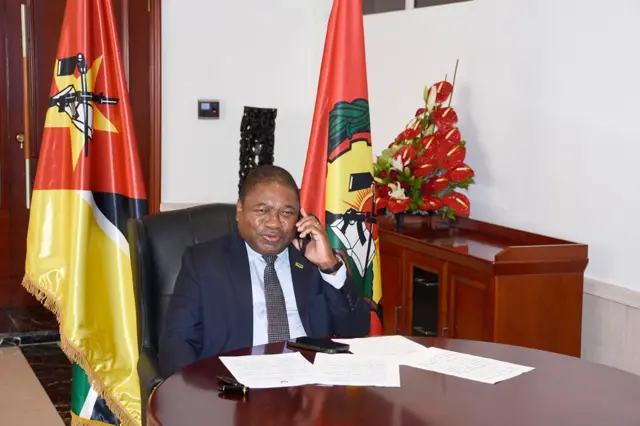 Image source, Mozambique Presidency
Image source, Mozambique PresidencyMozambican President Filipe Nyusi and his Ukrainian counterpart Volodymyr Zelensky held a phone conversation on Wednesday to discuss the situation in Ukraine.
The two leaders discussed the situation regarding the war as well as the impact it is having on food security, according to a tweet by Mr Zelensky.
The conflict in Ukraine has worsened already existing grain shortages in Africa caused by bad harvests and insecurity. Over 40% of wheat consumed in Africa usually comes from Russia and Ukraine.
The Ukrainian leader also congratulated Mozambique on its election as a non-permanent member of the UN Security Council.
Allow X content?
This article contains content provided by X. We ask for your permission before anything is loaded, as they may be using cookies and other technologies. You may want to read X’s cookie policy, external and privacy policy, external before accepting. To view this content choose ‘accept and continue’.
Mr Zelensky expressed his interest in explaining to African countries about the security situation in his country.
On his part, the Mozambican president said why his country abstained from voting on a UN resolution that condemned Russia's invasion of its neighbour.
Mr Nyusi said the dispute should be resolved through dialogue.
He welcomed Mr Zelensky's intention to speak to African countries.
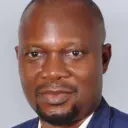 Chris Ewokor
Chris Ewokor
BBC News, Abuja
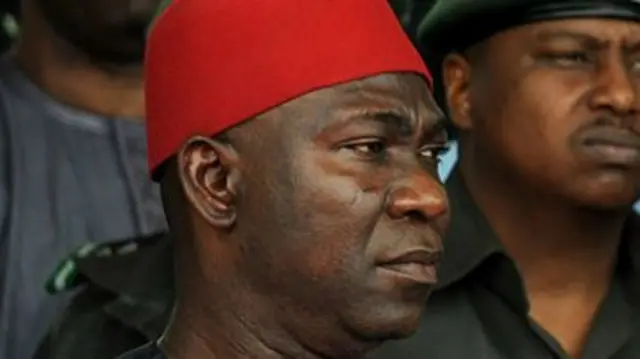 Image source, AFP
Image source, AFPA Nigerian senator will appear in court in London later Thursday, accused of trying to take a child to the UK in order to harvest his organs.
Ike Ekweremadu and his wife Beatrice are charged with offences under legislation to combat modern slavery.
They have been in custody in Britain since last month.
The Metropolitan Police, which arrested the couple, says the alleged victim is 15 years old.
It will be Mr Ekweremadu’s third appearance before the court. He has not entered a plea.
His arrest and detention along with his wife has triggered a move by the Nigerian parliament to get the country’s High Commission in the UK to hire a lawyer for his defence.
 Will Ross
Will Ross
Africa editor, BBC World Service
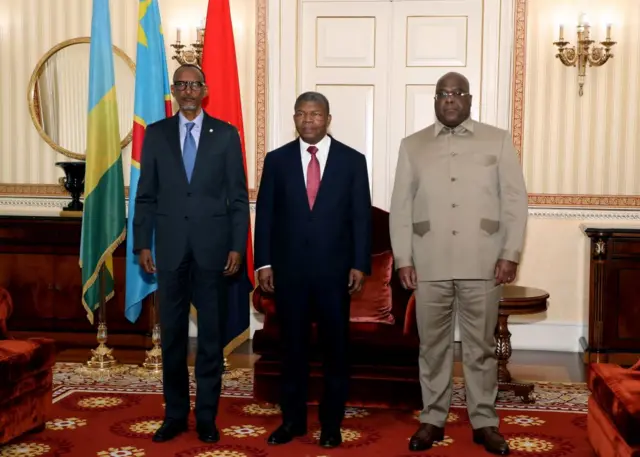 Image source, AFP
Image source, AFPRwandan President Paul Kagame and DR Congo's Félix Tshisekedi had talks in Angola
The presidents of the Democratic Republic of Congo and Rwanda have held talks at a time of increased tension over violence in eastern DR Congo.
DR Congo's President Félix Tshisekedi said after the meeting in Angola that he and his Rwandan counterpart Paul Kagame had agreed to restore trust and de-escalate tension.
Angolan President João Lourenço has been mediating the talks. He announced a "ceasefire" without giving any details.
“I am pleased to announce that we have had positive results, in our view, in that we have agreed on a ceasefire, among other measures," he said at the end of the talks.
There have been diplomatic tensions between the two neighbours - with DR Congo accusing Rwanda of backing a Tutsi militia known as the M23. Kigali denies this.
On Wednesday there were handshakes between the two leaders and some optimism – judging by the Congolese president’s comments.
Mr Tshisekedi said he and Mr Kagame had agreed to normalise diplomatic relations which have been extremely tense in recent weeks.
He also mentioned the immediate and unconditional withdrawal of the M23 rebel group from its positions in eastern DR Congo.
Quite how that will be achieved is unclear.
Our proverb of the day:
Quote MessageWhen hunger is removed from the list of woes, suffering is little abated."
A Yoruba proverb sent by Albert Ola. Eluwole in Ile-Ife, Nigeria.
In what is described as the biggest ever power crisis, there are blackouts of up to six hours a day.
Read More